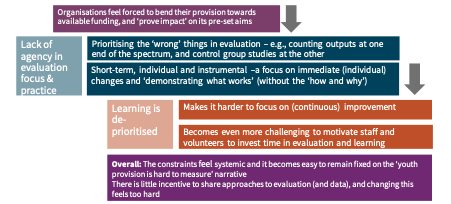Findings from our Rapid Needs Analysis
2022-04-28
During February and March, 172 people took part in the Centre for Youth Impact’s rapid needs analysis. The aim was to understand the needs, perceptions and demands of evaluation and learning practices across the informal and non-formal youth sector.
The Centre has not undertaken a needs analysis at a national level since 2014, so this piece of work was an important chance to explore participants’ feelings about the opportunities and priorities for evaluation and learning, the frustrations and barriers they experience, and what support they need in the future.
The needs analysis has now been published and includes the detailed findings from the interviews and survey. This was a rapid piece of work, and the lack of data about the size and nature of ‘the youth sector’ means it’s very hard to know what constitutes a representative sample. However, the discussions were rich in insight and helped the Centre understand the current ‘state of play’ amongst those who participated. There are three particular reflections from the research that have really got us thinking:
There is a clear sense of opportunity (and urgency) around improving evaluation and learning practice in informal and non-formal learning provision. Those who participated in the needs analysis were actively thinking about the purpose of evaluation and learning in their organisations, and critically reflecting on how they might improve their practice. Agency was a strong theme - 76% of the survey respondents said they would measure the impact of their work even if no one was asking them to.
People also wanted to see the sector move on from long-standing debates about the challenges of evaluating youth work and provision for young people, and play an active role in finding solutions. Respondents told us that they wanted to see greater consistency – in talking about youth work and provision for young people, agreeing common outcomes, and through accessing recommended, common tools to collect data and resources (whilst retaining flexibility to tweak these to different contexts).
Frustration levels remain high. Despite wanting to see changes, there is exhaustion over precarious funding and fragmentation in the sector. Practitioners are time poor and can struggle to embed evaluation and learning in day-to-day practice, and meaningfully act on learning. Many participants felt that funders have too much power over evaluation practice. It was common for repsondents to feel that the structural issues are complex and overwhelming. We identified a cycle that is driven by the current funding and commissioning context (see diagram below). Breaking this cycle is key to helping collaboratively achieve step-change in the way those working with and for young people act on evaluation and continuous improvement, in all youth settings, to improve outcomes.

Evaluation and learning support needs are understandably diverse and a menu of options is required. An organisation operating at a very local level without a developed approach to evaluation and learning might require clear and simple guidance to get started on the right pathway. Larger organisations that have been collecting data for a number of years and who want to use it more smartly and communicate their learning more widely might need bespoke mentoring and connections to wider expertise.
Respondents felt passionately that any support must be easy to access, flexible, and acknowledge different contexts in which organisations are operating. Support to implement processes and develop capacity to make any evaluation and learning practice sustainable was also highlighted – too often, training takes place, but once back into day-to-day delivery it is hard to find the bandwidth and organisational commitment to make changes and keep them going.
What happens next?
The needs analysis helped inform the Centre’s new Resource Hub and training offer. These have been comprehensively refreshed and revised, taking into account the direct feedback from the sector.
The needs analysis was just the starting point and the Centre’s work will continue to evolve over the coming months and years. We would love to hear your feedback, and in the meantime there are three things you can do now:
- Look at the resource hub – download tools, resources that you can adapt and use
- Read the training offer – and get in touch with your regional impact network if you want to get more involved at a local level
- Use the needs analysis findings to prompt conversations in your own organisations around evaluation and learning practices (you might find the section on organisational contexts useful!).
